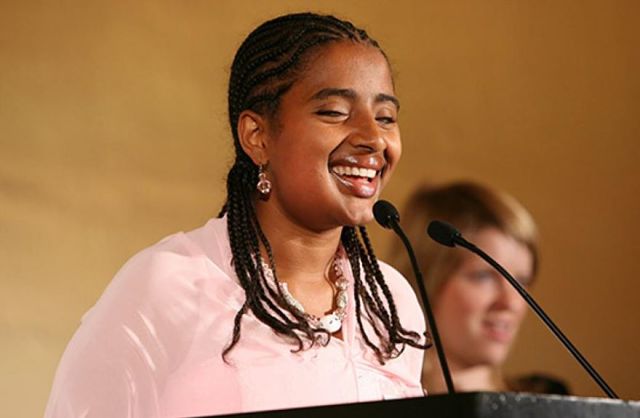 Ethiopian lawyer Yetnebersh Nigussie is being honored with the Spirit of Helen Keller Award. It's named for an American who promoted the rights of women and people with disabilities. (Photo courtesy of Light for the World)
Ethiopian lawyer Yetnebersh Nigussie is being honored with the Spirit of Helen Keller Award. It's named for an American who promoted the rights of women and people with disabilities. (Photo courtesy of Light for the World)
VOA News
By Salem Solomon
Ethiopian Disability Rights Advocate Champions Opportunities for Women
Yetnebersh Nigussie had opportunities other girls in rural Ethiopia can only dream of.
Unlike her peers growing up in Wollo province, Nigussie wasn’t married off as a young girl or forced to work at home.
Instead, she devoted herself to learning.
Nigussie moved to the capital, Addis Ababa, and pursued an education, eventually earning a law degree and founding the Ethiopian Center for Disability and Development, a group that advocates for the rights of disabled people in her home country.
What makes Nigussie’s accomplishments especially noteworthy are the challenges she overcame.
Nigussie lost her sight at age 5 after contracting meningitis. But where some see obstacles, Nigussie, now 36, sees potential.
“I believe challenges are opportunities. So we human beings are created to change challenges into opportunities,” she told VOA’s Amharic Service in a phone interview last week. “That’s why I always tell [people] that, when I turned blind at the age of 5, that brought a new opportunity. I would have never been educated had I not been blind. All my siblings and the children in my area, in my age [group] — none of them have gotten educational opportunities.”
Advocacy
Nigussie has built her career on advocating for people with disabilities. In recognition of her accomplishments, she will receive the prestigious Spirit of Helen Keller Award, presented by the nongovernmental organization Helen Keller International, at a May 2 gala in New York.
First presented in 1959, the award is named for an American activist who was deaf and blind. In the late 19th and early 20th centuries, Keller gained fame for her lectures, writings and advocacy work promoting the rights of women and the disabled.
“Receiving the Spirit of Helen Keller Award is a great thing because Helen Keller has been my source of inspiration that I am living. We believe in the same thing: telling people not to focus on our disabilities, [but] rather on our abilities,” Nigussie said. “Helen was always saying that ‘I don’t know what darkness is, but I know there is a light.’ So it’s a great thing to be associated with such a fantastic hero who has been always my inspiration in life.”
Recognizing contributions
Now, Nigussie wants to honor women making an impact across the globe with a separate award: Her Abilities, which she will give out annually in partnership with Light for the World. Nigussie is an adviser to the Austria-based organization.
The award will recognize women making an impact in the areas of health and education, rights, and sport and culture. It is open to women with disabilities worldwide.
“The reason we decided to focus on women with disabilities is that we believe they face double, and sometimes triple, discrimination,” Nigussie said. “We need to spotlight their work and make sure that they are visible to the world. … So it’s very much in line with my personal motto: I have one disability and 99 abilities. So we’re not going to focus on the one disability. We’re going to talk about their 99 abilities — or more — and we’re going to celebrate their achievements, their greatness.”
Nominations for the award will open July 2, and winners will be announced in December.
Overcoming barriers
An estimated 15 million people in Ethiopia live with disabilities, and they often lack access to resources and protections while facing stigmatization and a heightened risk of poverty and social isolation. According to the World Health Organization, Africans with disabilities face significant gaps in their access to welfare, education, vocational training and counseling services.
Nigussie’s organization, the Ethiopian Center, has sought to address these barriers through job training and publications. For example, it offers an online guide to Ethiopian hotels, restaurants and offices that are accessible to people with disabilities.
The activist also hopes to continue advocating for legal changes, including overturning a restriction that makes it illegal for deaf people in Ethiopia to drive.
Nigussie said she is humbled by the recognition and motivated to do more.
“I believe all these challenges would lead people with disabilities, in particular in Africa, to make sure that they overcome the challenge,” she said. “No challenges are coming to stop us. They are coming as a puzzle for us to solve.”
—
Join the conversation on Twitter and Facebook

























